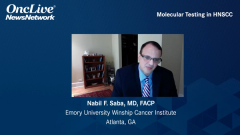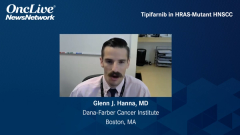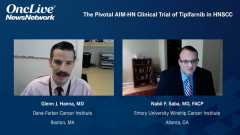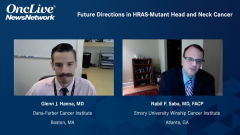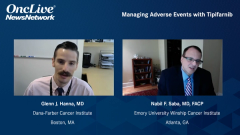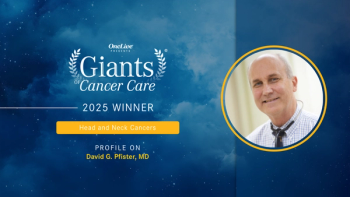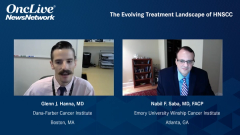
Molecular Testing in HNSCC
Guidance for incorporating initial and repeat molecular testing in head and neck cancers into clinical practice.
Glenn J. Hanna, MD: Speaking of the pros and cons or the limits and benefits of targeted options for head and neck cancer, albeit somewhat less compelling than other spaces right now, how are you incorporating molecular testing in your practice? Are you using a commercial or an in-house assay? Who are you testing, is it everyone with recurrent, incurable, or metastatic disease? Are you selective, or even do you do it sooner than that?
Nabil F. Saba, Md, FACP: Very good question. I want to say that things have progressed and improved over time. I think a few years back we were not testing many patients, but since the approval of immune checkpoint inhibitors, we have been testing more and more. At our center, I can tell you not every patient is getting a genomic analysis, which is something I think we strive to achieve, at least, because I believe with the HRAS story, certainly it makes sense to check for recurrent metastatic patients. If you go to other histologic types, we check everyone, like for thyroid cancer, for example, saliva gland carcinomas, there’s a very low threshold of checking, and I would say we check on all patients.
But squamous cell cancer of the head and neck, we have not really gotten there to check on everyone, even though I think we should be getting there. Glenn, you may want to comment. Perhaps at your center it’s a little different. We’re all in academic large tertiary centers, but the practices may differ among the different centers. To answer your question about whether we use an internal test, we do it for certain tumor types. Like lung cancer, we have our internal panel. We could certainly use it as well for other diseases, including head and neck squamous cell carcinoma, but we’re also partnering with commercial entities. Our cancer center as a whole has partnered with commercial entities to basically do this in an easier way. We have ongoing discussions to improve on the frequency of testing and on structuring this in a way that benefits patients the most. As you know, it’s a work in progress.
Glenn J. Hanna, MD: I would say we’re approaching molecular testing similarly. On the whole, my group has been proactive about sequencing anyone with recurrent, incurable, or metastatic disease, trying to capture everyone. But certainly, if they felt the patient was well enough to potentially receive something in that context, we definitely test them, if tissue is available and not exhausted. We try to prioritize a more recent biopsy. Obviously, a fresh sample is always great, but we’re often testing archival tissue from a biopsy that proves recurrent metastatic disease. But we will test the original resection or original tumor if that’s all we have.
Luckily, it seems like a lot of head and neck mutations are earlier events, where there may not be resistance evolution in some of the founder events like TP53 or NOTCH1 alterations, or tumor suppressor alterations. I feel like we’re comfortable checking the primary tumor in many patients. I would say we do use a mix of commercial assay or in-house testing. We do also have an in-house panel test that covers almost 400 genes and 60 introns or rearrangements, so I would say it’s a mixed bag. Sometimes the commercial tests can be a little more streamlined because they’re a more refined program or entity. It’s mixed, but they usually report, thankfully, the same information, as you alluded to. We usually are able to get PD-L1 status for immune marker, and then we get the mutations of interest, as you mentioned, PI3K, FGFR, NOTCH, HRAS, TP53, mTOR, AKT, all of those alterations, and any amplifications. EGFR amplification, although it may be a bit unusual, can be of interest if you’re thinking about using something like an EGFR antibody or whatnot.
I think it’s across the board, I agree with you. I think community oncologists are starting to recognize that we, as head and neck oncologists, do value the genomic testing results beyond just PD-L1 immune testing. I’ve seen a lot more patients come to me with squamous cell head and neck cancers in the advanced setting with testing in hand from commercial vendors or commercial platforms, which is great because it streamlines care a bit. Do you ever repeat testing in the trajectory of a patient’s course if someone is no longer responding, or are there any time points where you repeat testing?
Nabil F. Saba, MD, FACP: Fascinating question. I tend to do that, yes, in certain situations where, for example, the patient has now recurrent metastatic disease. They were treated 5 years ago for locally advanced disease, and we have tissue from that time. I think those are clearly patients who need additional testing, who need another look. Even in patients who may have new onset of recurrent metastatic disease, for example, I tend to want to rely more on the most recent biopsy to try to get a more accurate answer as far as what’s driving the disease. Even though, as you know, in squamous cell cancer, the changes over time do happen, but the lack of actionable mutations or the paucity of these I think has resulted in people not checking too much. To follow up on what you said, I think cancer centers in general should lead the way to set the example, if I can use this term, for others to follow through. Certainly, PD-L1, PD-1, no question, that needs to be done on every patient with recurrent metastatic disease. This is the situation we’re in, but to answer your question, yes, I do tend to sometimes retest.
Glenn J. Hanna, MD: I would say maybe I would do it more if resources were also permissive. Also, as you pointed out, if we knew there was some sort of event that predicted, or we knew someone was going to develop resistance, and there were some predictable resistance mutations or pathway alterations, it might be more compelling. This is the case in lung cancer, where sequential genomic testing is employed, whether in the tissue or in the bloodstream or plasma. I’m hopeful that someday we’ll get there with head and neck cancer.
Transcript Edited for Clarity


